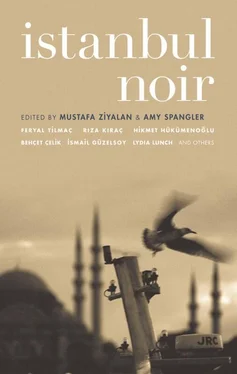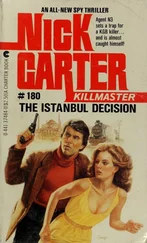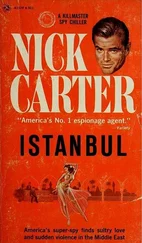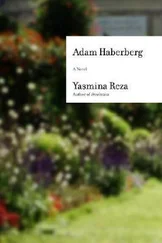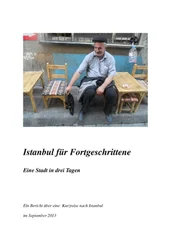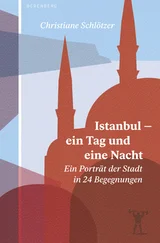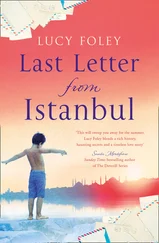I made it up to Büyükdere Avenue; there was an iron rail that ran between two lanes to keep people from crossing.
I walked toward the bus stop, where a group of people were standing waiting. I killed some time glancing around at the towering buildings and skyscrapers. I had five bodies, five skyscrapers, and one suspect who really shouldn’t even be called a suspect. I didn’t have a shred of evidence; all I had was a hunch. I kept my eye on the bus stop across the street, the factory stop... Faruk had told me they call this place “Silicon Valley” now. I took the stairs leading down from behind the stop, and then walked through the underpass and along the dirty dimness of flickering fluorescent lights and the reverberating drone of traffic, before emerging on the other side and heading up another set of stairs. The old Neyir building had been turned into a courthouse, restored complete with black windows to give it a modern air. The pharmaceutical factory was still there across from the new courthouse, but with a few added stories and an annex in the rear. As I walked toward the factory stop, I was so sure of the footsteps silently trailing after me that I didn’t even turn around to make sure they were really there.
Faruk was blabbering about something he’d read in the paper. “Sadık Bey, they say that if all the toilets in the skyscrapers on this avenue were flushed at the same time, Istanbul’s entire sewage system would explode,” he told me, laughing.
“We’d really be up shit creek then, wouldn’t we?” I said.
“Somebody ought to test that theory,” Faruk replied, still laughing.
As I made my way toward Mövenpick Hotel in 4th Levent, I could still feel the pair of eyes behind me. The road used to be lined with all kinds of factories, big and small, but now the corporations had taken over and it was one long series of buildings fronted by black glass, all postmodern, all tightly guarded by private security companies, all rigged with cameras in every corner.
About ten minutes later I reached the lot where the bus terminal used to be, before they tore it down. Somebody would want to erect a skyscraper here too; it was just a matter of time. I crossed the street at the Çeliktepe intersection. When I reached an iron curtain surrounding a new skyscraper still under construction, I turned around and looked behind me, hoping to see the eyes that were following me.
When I entered the hotel lobby, my head was spinning from all the noise and the strange melancholy I had picked up on the avenue. The woman at the reception desk greeted me with a smile and handed me the card key to my room.
I was planning to have a cup of coffee in the lobby and then head out to grab a bite to eat. But then I noticed that a man sitting by himself in the lobby was watching me. A blue halo of cigarette smoke encircled his head. When he saw me look at him, he put out his cigarette, stood up, and walked toward me. “Hello Sadık,” he said, with a confident smile on his face.
I gave him a quizzical expression. “Hello.”
The look on his face was eerily distant. He was a big guy — big-boned, that is, though with a bit of a paunch and chubby cheeks; he must have been in his mid-fifties. I couldn’t place him.
He continued to smile as he shook my hand.
“I could imagine you growing up to be just about anything but a police officer,” he said, still polite as could be.
Maintaining my air of formality, I responded to his words — which seemed more an expression of surprise than a compliment — with a slight smile.
“I didn’t expect you to remember me,” he said as he sat down. “My name’s Haldun, I was a friend of your brother’s.”
I tried to look him in the eye. There was something there, something hidden. But nothing about him reminded me of the man from thirty years ago, nothing but a subdued tone of compassion in his voice that made me think of my brother’s funeral.
I just stood there, frozen, while he continued to smile.
“Why don’t you have a seat?”
We sat across from one another. I felt sheepish and guilty, the way you feel when you run into someone, especially someone older than you, and you just can’t place them. Though my body may not have followed suit, I knew that my soul was crouching in some corner.
Haldun Abi and I left the hotel and walked toward the factory stop. He talked the whole time, as if he was desperate for conversation, but I don’t remember a thing he said.
We reached Kanyon, a high-class mall, and he said to me, “I can hardly take someone like you out just anywhere, now can I?”
He passed through security like a ghost, as if nobody even saw him. The security officer walked up to me. I showed him my police ID and he took a step back.
As we walked through the broad corridors of Kanyon, Haldun Abi asked me, “So, how are things in Ankara?” He said it like he needed a breather; tired of kicking the ball around by himself, he decided it was my turn now.
My response added up to less than a minute of trite clichés, and Haldun Abi reacted by giving me an odd expression. Actually, it wasn’t really so much odd as it was angry.
We sat down at a restaurant. I ordered for both of us. Haldun Abi lit a cigarette. I could read the annoyance in the dull look on his face.
“I’m waiting for you to ask,” he said all of a sudden.
“Ask what?”
“Why I came to find you after all these years.”
How could I? I remained silent.
“I talked with İlhan. He said you went to see him this afternoon.” He sounded irritated. “That’s why I came to the hotel. I’m telling you this because, even though we haven’t seen each other for years, you’re important to us. No matter how old you are, we have to look out for you; you’re his little brother. You understand?” His questioning eyes were fixed squarely upon me.
I nodded. I could understand him trying to protect me, but protect me from what, I had no idea. If there was anyone who needed protecting, it was İlhan, not me.
“With everything changing as quickly as it is, there are certain things we have to do to stay afloat. You’re a policeman, you have certain obligations to the state.”
I’d heard this kind of talk before, and I could sense where it was leading.
The waiter brought us our food. He looked tense for some reason. He left a huge plate of pasta with seafood and a glass of dark beer in front of Haldun Abi. I’d asked for mantı .
Haldun Abi put out his cigarette and started digging into his food. He paused and looked me straight in the face. “You’re going to end this investigation and go back to Ankara. If you try to mess with İlhan, they’ll kill you,” he said.
Blood rushed to my head, and I knew that if I didn’t keep my composure, I was going to say the first words that came to mind, and that I would regret it later.
“You have no right to order me around like that, Haldun Abi. Especially when it comes to a matter like this. Take it any further and I’ll have to bring you in,” I replied.
He began to laugh. It seemed my words had put him in a good humor. He laid down his fork, which was still wrapped in spaghetti, and covered his mouth with a napkin. The color was back in his chubby cheeks.
“I know more about those guys who died in the skyscrapers than you do.”
“As much as you’ve heard on the news,” I said.
He picked up his glass and took a sip. He leaned back, relaxed, it seemed.
“I knew every one of them,” he said.
“You trying to get me to cough up some info about the investigation, Haldun Abi?” I asked.
“I don’t need to. Like I said, I know more than you do.”
“What do you know?”
“Every one of them was on the board of directors at the firm where he worked. These aren’t ordinary, unconnected murders. I’m going to tell you why, but first you have to tell me why you suspect İlhan.”
Читать дальше
